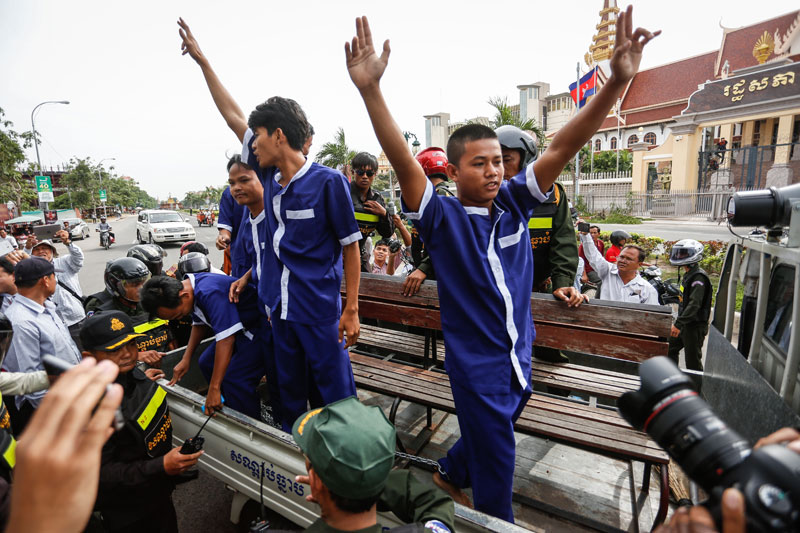Authorities in Phnom Penh on Sunday arrested and released six people dressed in prison uniforms and chained together by their legs for protesting outside the National Assembly against a recently approved law that threatens to muzzle NGOs critical of the government.
The detention of the six followed the arrest and release of five other activists last week for handing out leaflets critical of the law at markets around the city.

City Hall spokesman Long Dimanche said the activists were arrested Sunday because they had failed to ask for permission to protest. (The country’s demonstration law says protesters need only notify authorities of their plans.)
“We could not let them go on because their actions were illegal,” he said. “It was funny that they wore prison clothes and chains like prisoners, but is it appropriate to do it in public without permission? So we had to act to stop them. Their actions hurt Cambodia’s image.”
About a dozen activists had gathered in front of the National Assembly for the protest, including a few from the Khmer Youth Empire, a student group. Its director, Heng Samnang, said the chains and prison garb were meant to express their concerns about the law, which will require most NGOs to register with the government.
Critics fear the government will use vague provisions demanding political neutrality and respect for Cambodian traditions to block or shut down groups that criticize the CPP.
“We wanted to send a message to the government that when it implements the law, it will use the law to arrest us because our association has not registered yet. And when we try to protest to protect the forests, it will prevent us from helping the communities,” said Mr. Samnang, who joined the demonstration but was not arrested.
“We were just exercising our rights under the Constitution to demonstrate and express our views,” he said. “These arrests show that we are not a democratic country.”
Am Sam Ath, technical supervisor for rights group Licadho, who had been observing Sunday’s protest, said the arrests were not justified.
“The arrests of the youth were illegal because they were protesting peacefully and they were not affecting public order,” he said.
The National Assembly passed the NGO law on July 13 and the Senate followed suit on Friday. On both occasions, CPP lawmakers pushed the law through amid boycotts by the opposition, which opposes the law.
The U.N., U.S. and European Union have also urged the government not to approve the law as written, drawing accusations of political interference from the Foreign Affairs Ministry.
Mr. Samnang said the six activists were released just before 6 p.m. after they agreed to stop protesting without permission, to stop wearing chains and prison uniforms, and to hand over the props and costumes.
Mr. Dimanche confirmed their release and said the six would “face the law” if they violated any of the conditions.



